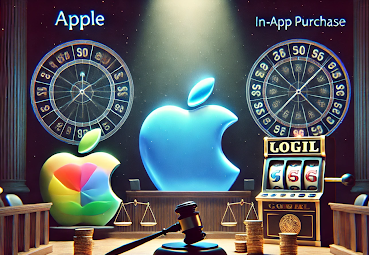Apple and Google Face New Federal Lawsuit Over Sweepstakes Casinos

Apple and Google are once again under legal scrutiny following the filing of a new federal class-action lawsuit that accuses them of enabling illegal gambling through sweepstakes casino applications. Submitted in the U.S. District Court for the District of New Jersey, the case revives earlier legal efforts that had previously been dismissed, this time placing exclusive focus on the two tech corporations.
Filed by Julian Bargo of New Jersey and Lamar Prater and Rebecca Platt of New York, the complaint brings forward allegations under state and federal statutes, including the Racketeer Influenced and Corrupt Organizations (RICO) Act. The lawsuit differs from its earlier iteration by excluding operators such as High 5 Casino and CrownCoins Casino, instead solely targeting Apple Inc., Apple Payments Inc., Google LLC, and Google Payment Corp.
Four Key Allegations Against Apple and Google
The plaintiffs argue that Apple and Google actively supported sweepstakes casinos by providing the technological and financial infrastructure necessary for their operation. The lawsuit outlines four primary claims:
- App Distribution: Apple and Google are accused of giving users access to sweepstakes casino apps through their respective digital storefronts—the App Store and Google Play Store—thus enabling broad public participation.
- Revenue Sharing on In-App Purchases: According to the filing, both companies collected fees on virtual currency purchases used within the gambling apps, directly profiting from player transactions.
- Payment Processing Services: The complaint asserts that the tech giants facilitated financial transactions between consumers and the casinos using their proprietary payment systems, essentially acting as intermediaries.
- Targeted Advertising: The companies allegedly used algorithms to direct vulnerable users to the gambling apps, amplifying participation and monetization through behavior-based targeting.
These accusations are grounded in several legal frameworks, including gambling loss recovery statutes in New Jersey and New York, the New Jersey Consumer Fraud Act, and the federal RICO statute.
Legal and Financial Ramifications Could Be Far-Reaching
Legal analysts have noted that this case may have significant implications. Attorney Daniel Wallach pointed out that the lawsuit portrays Apple and Google not as neutral platforms but as integral facilitators of the alleged illegal gambling enterprise. The companies’ data analytics capabilities allowed them to track user spending and behavior, the complaint argues, which allegedly shaped how ads were delivered to high-value users.
Should the lawsuit succeed, Apple and Google could be found liable for user gambling losses nationwide. The damages could reach hundreds of millions of dollars—and under the RICO Act, those damages could be tripled, potentially increasing the financial exposure to several billion dollars.
Beyond monetary penalties, the lawsuit may also push for industry-wide changes in how app marketplaces handle gambling content. A ruling against the companies might compel Apple and Google to impose stricter guidelines for apps that involve gambling mechanics, regulate in-app transactions more tightly, and rethink algorithm-driven user targeting.
This latest legal action adds to the growing debate over the legitimacy of sweepstakes casinos and the responsibility of tech platforms in policing gambling content. It also underscores the broader scrutiny digital marketplaces are facing as their roles in facilitating online gaming—and potentially illegal gambling—come under increased examination.
Source:
Apple and Google Sued Again Over Sweepstakes Casino Operations, Real Money Action, March 27, 2025.







